Graham Reid | | 13 min read
Ben Waters with PJ Harvey: Lonely Avenue
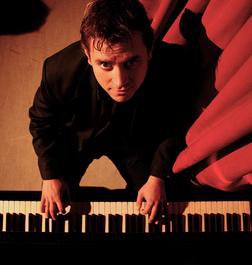
When he was just nine – 26 years ago
– Ben Waters briefly saw something in a pub which changed his life.
He was at his auntie and uncle's 25th wedding anniversary
in the Wynyard Gap in Somerset, just across the border from his home
county of Dorset, and the great pianist Ian Stewart was a family
friend who sat down and played some boogie-woogie.
“It was the first live music I had
ever heard," says Waters, "and he had his band Rocket 88 there. We could only stay
for half an hour because we were so young but I just remember
thinking it was awesome.
“The thing was not just that it was
the first live music I'd heard, but I didn't get to hear music like
that. All the kids at school were into all sorts, like [Europe's] The
Final Countdown, which I have nothing against but it didn't really
do that much for me.
“So I heard Ian and thought it was
incredible.”
Ian Stewart – “Stu” as he is
widely known – was one the silent sidemen of rock, the original
Rolling Stone whose lantern-jaw looks didn't fit with the aspiring
rhythm and blues band which Brian Jones had founded in '62. Stu joined Jones and the others -- Mick, Keith and Charlie -- would follow later. When he was
sidelined by manager Andrew Loog Oldham in May '63 he didn't cause a fuss but stayed on as a roadie for the band and played on all their albums (except Beggar's Banquet) up to his death in December '85 of a heart attack. He was 47.
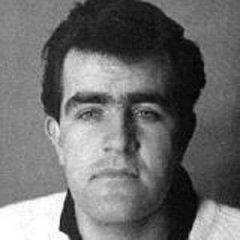 Much loved by musicians, he also played
on albums by Led Zeppelin (Boogie with Stu was on Physical Graffiti) and George Thorogood (Bad to the Bone), was in the acclaimed Blues Band alongside
Paul Jones formerly of Manfred Mann and in his own groups including
Rocket 88.
Much loved by musicians, he also played
on albums by Led Zeppelin (Boogie with Stu was on Physical Graffiti) and George Thorogood (Bad to the Bone), was in the acclaimed Blues Band alongside
Paul Jones formerly of Manfred Mann and in his own groups including
Rocket 88.
Waters, now a boogie-woogie pianist
of some repute who had been invited to play with Rocket 88 after Stu's
death, wanted to pay tribute to the man who had influenced him.
So he decided to do a solo tribute, but Stones drummer Charlie Watts heard about it and wanted in, then came Ronnie Wood, and so Waters sent Bill Wyman, Keith Richards and Mick Jagger a note saying what he was up to.
They all signed on and
the album Boogie 4 Stu: A Tribute to Ian Stewart (reviewed here) includes a version of Bob Dylan's Watching the River Flow which has the Wyman/Wood Stones
line-up together for the first time since '92.
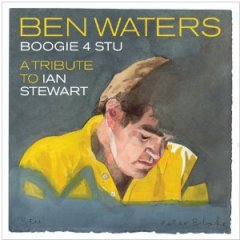 There's also a version of Ray Charles'
Lonely Avenue featuring PJ Harvey – whose parents were friends of
Stu's – and a guest list which include Jools Holland and members of
Rocket 88.
There's also a version of Ray Charles'
Lonely Avenue featuring PJ Harvey – whose parents were friends of
Stu's – and a guest list which include Jools Holland and members of
Rocket 88.
"Yes, it grew into something which I
didn't expect," says Waters. “They all came along for Stu really, which says a lot about Ian Stewart that 25 years after his death
people still want to do something for him.
“Keith told me, 'People say bad
things about Me and Mick, but I've never heard a bad word about
Charlie Watts and Ian Stewart.' It's hard to be sacked from a band in
the way he was and most people would have said, 'Fuck you, I'm
off.' But he didn't, he said he'd stay on as a van driver.
“That's a big thing to do, there
can't have been any ego to him and even in his own band he was
getting piano players in. There are not that many who would do that.
“I think he was a team player and
pretty selfless, not just with the Stones but all the other bands he
played with.
“He worked hard for the furtherment
of all the bands he played with. I don't think he craved adulation.
He seemed to have gained more respect over the years. Every person
you speak to across the board, famous or not, all liked Stu.
“Jeff Beck said he drives the long
way home to go past Stu's house because he loved him so much.”
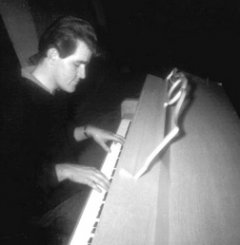 For Waters however that seminal moment
of seeing Stu play didn't take a grip until many years later when he
saw a Fats Domino 60th birthday celebration on television
which featured Fats, Ray Charles and Jerry Lee Lewis. As soon as he
saw the fat man smiling and heard the boogie-woogie sound he
remembered Stu and recalled what happy music it was.
For Waters however that seminal moment
of seeing Stu play didn't take a grip until many years later when he
saw a Fats Domino 60th birthday celebration on television
which featured Fats, Ray Charles and Jerry Lee Lewis. As soon as he
saw the fat man smiling and heard the boogie-woogie sound he
remembered Stu and recalled what happy music it was.
“I said to mum and dad I wanted to
learn to play and they say my aunt and uncle still had Ian's videos
that he'd got on tour in America, videos of Amos Milburn, Albert
Ammons, Pete Johnson, Cab Calloway, Lionel Hampton, Louis Jordan . .
. Just hundreds of hours of footage.
“My biggest treasure was finding two
concerts Stu did. One was at a Montreux Jazz Festival and one in
Wales. You could just see him playing and I was trying to learn to
play like that and work out what he was doing.
“Then another friend of my aunt and
uncle's, saxophonist Will Garnet who played in Rocket 88 and was on the
video, called and asked if I could come and do a show with them. I
said, “Yes please” but thought I had to really nail it and so I
tried to copy Stu – and never got it quite right.
“Then I started playing gigs with the
band and that helped a lot, you just learn to play with the band.
“It was just happy music and must
have been in the blood because my dad loved Fats Domino. But I
wouldn't be playing if it wasn't for Stu so I wanted to say thank you
to him with this album”.
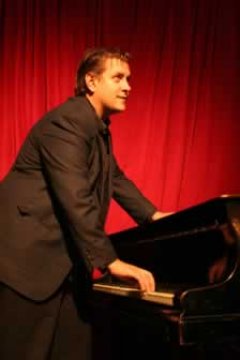 Waters says Stu' style was unique in
that his was a rolling kind of sound (“he put the roll in
rock'n'roll”) and was like Otis Spann in that he filled the gaps
and in a band that was a bit “staccato” his sound would take the
rough edges out.
Waters says Stu' style was unique in
that his was a rolling kind of sound (“he put the roll in
rock'n'roll”) and was like Otis Spann in that he filled the gaps
and in a band that was a bit “staccato” his sound would take the
rough edges out.
When he first had the idea of doing the
album he was prepared to book a small local studio but when Watts got
wind of it and wanted in Waters knew he needed a better environment.
He approached Jools Holland to hire his studio (Holland refused, but
said he could use it for free if he could play on the album too), then Wood was in and so the letter went out to the other Stones, including Bill Wyman.
“But trying to get the Rolling Stones
together, I dunno. They are all doing stuff and around the world. One
is in the Caribbean, one is filming in America . . . it's quite hard
to find the place you can do it.
“It got to a point where I said I
needed to finish it off in the next two weeks and Keith said, 'Right,
I can do next Thursday in New York.' This was on the Sunday so I had
to book a last minute flight and you have to have this special
electronic thing to travel to America and that took 72 hours and I
had to go to the embassy.
“I had to rush to New York and record
it then send it to Mick and everyone did everything in one take. So
it was more the logistics of getting people together that took the
time. And then after we finished I didn't want to mix it myself.
Before if I'd done it myself I would have mixed it but with all these
guys on it, it needs the best so I went to Glyn Johns and then we had
to find a mixing studio.”
Waters laughs that Richards would have
no clue about the logistics of him getting to New York at such short
notice but despite being jet-lagged he wouldn't have missed it.
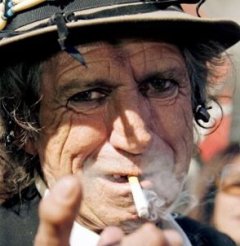 “At the time Keith had his book just
out and it had knocked Mark Twain off the number one spot. So he'd
done so many interviews he was fed up and just he wanted to make
music. 'I've been let out of jail', he said. A lot of the entourage
were saying, 'Do you think we should go now, Keith?' and he'd say
'No' and we'd talk and jam a bit more until the early hours. That was
good fun.”
“At the time Keith had his book just
out and it had knocked Mark Twain off the number one spot. So he'd
done so many interviews he was fed up and just he wanted to make
music. 'I've been let out of jail', he said. A lot of the entourage
were saying, 'Do you think we should go now, Keith?' and he'd say
'No' and we'd talk and jam a bit more until the early hours. That was
good fun.”
The Dylan song on which all those
Stones appear – Richards, Wood and Watts are also on Worried Life
Blues – was a choice that made itself.
“Ian Stewart didn't like Bob Dylan,
he was a man of very specific tastes. Charlie said to me the other
day that Stu never changed in all the years he knew him. He always
had the same haircut, the same clothes and liked the same music. He
didn't like avant-garde jazz but Lionel Hampton. His field was very
narrow.
“He didn't like too much rock'n'roll
but liked r'n'b. He used to say quite often that Bob Dylan only ever
wrote one decent tune and the rest were crap, but he liked Watching
The River Flow so I had to do that.”
Leon Russell played piano on the
original session – “I think that's why he liked it, it had
boogie-woogie piano on it – but Jagger does an extraordinary vocal
on this new version where he drags the vowels and vocal lines out.
“He did it in the south of France and
funnily enough Charlie had gone down to visit so they were both
there. He gave me an e-mail address but because it was a big file –
and I'm not into technical things – I couldn't send the whole track
down. So we couldn't send the brass or Jools Holland on Hammond.
“So all we sent was the piano and
drums. So he heard that and sung it and sent it back. I did a guide
vocal which was very straight but Mick dragged things out and it's
really expressive. His vocal is incredible and I wonder if it helped
just having piano and drums. It was very barren and not much going on
so it must have made him feel like he did have to fill up the gaps
more.
“But it's also a good platform to
sing over because if you've got guitars and so on you are fighting
for space. If you've just got this blank canvas it gives him more
scope to take charge of it and I think that's what he did.”
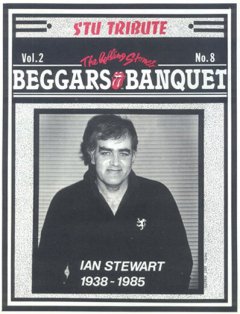 Waters said he enjoyed recording Wood
on Worried Life Blues but when he took the track to America Richards
said. “Why did you let him sing on that? That is mine and Stu's
tune, I want to sing that too.”
Waters said he enjoyed recording Wood
on Worried Life Blues but when he took the track to America Richards
said. “Why did you let him sing on that? That is mine and Stu's
tune, I want to sing that too.”
“So he sang it and I said later,
'Keith, how would you feel if there was one verse each by you and
Ronnie” and he said that would be alright. So I did that and I
phoned Mick Jagger and told him what I'd done. He laughed and said in
jokey way, “I bet that sounds fucking awful!”
The Lonely Avenue track with Polly
Harvey was her choice and she had grown up with Stu and Rocket 88
dropping around to see her parent and stay at the house. She had a
lot of Stu's records and searched for a song that she felt
appropriate.
“She liked that tune and liked the
lyrics. She only likes to do things she's really proud of and that
mean a lot to her and she did it in her unique style. She said she'd
like to record it on Stu's piano so we went to my aunt's house and
recorded in their living room. It was such a lovely day, and she did
two very ethereal vocals in the background and put saxophone on it.
“She does things in a unique way and
it was a good experience for me recording with her because she is
very in command of what she does. I've played that piano quite a lot
and in way, although it's all in my in my head, it makes me play more
like Stu.”
Ian Stewart was quite an eccentric – he didn't play anything in a minor key, and in his biography Richards tells of him coming on stage at stadiums
wearing Hush Puppies, and with a coffee and a cheese sandwich which
he's put on top of the piano – and during the recording of the
album Waters was hearing great stories of Stu in the old days,
generally about him driving the van with lawn chairs in the back on
top of amps for the rest of the band to flop out on.
 “When I first started playing people
would say 'Who are your influences?' and I'd say Fats Domino, Ray
Charles and Ian Stewart. And they'd say, 'Ian who?'
“When I first started playing people
would say 'Who are your influences?' and I'd say Fats Domino, Ray
Charles and Ian Stewart. And they'd say, 'Ian who?'
“But he was equally as talented as
those others, but in a different way. And he was quietly inspirational
on records that most people have got, whether it be the Stones or Led
Zeppelin.
“So he had done a lot for the English
music scene. So I thought if I can do a CD and tell more people about
him I would be really proud.”
And in a nice touch the album ends with
Ian Stewart himself playing Bring It On Home To Me.
“That's my favourite tune on the
whole thing. When we put it on and listened to it it sent shivers up
my spine because I hadn't listened to it for a while. It sounded so
fresh and better than anything we'd done.
“It's a unique track because there
are not many tracks that feature him so much.”
The album closes a chapter for Waters -- some of the proceeds go to the Mending Broken Hearts Appeal of the British Heart Foundation -- but he's hardly short of things to do. He tours regularly playing
boogie-woogie and in some circles he is in demand as . . . a wedding
pianist?
You played at Jools Holland's wedding,
which must be strange to be the pianist at a pianist's wedding?
“Yeah, it was fantastic. I played
through dinner. He had about 700 guests and people flying in by
helicopter. Prince Charles, Paul McCartney, Ringo Starr, Dave Gilmour
. . . And a lot of English comedians like Dawn French and Lennie
Henry.
But Jools went round and made sure his
old uncles and the staff who had worked for him were alright. It was
big party. Jools has got this way of disarming you whatever you do.
He'll make sure you feel special.
 “At the wedding I started up and he
must have known I was a bit nervous. I did Suitcase Blues, which is
on the Stu album, and he came over and put his arm around me and said,
'How did you know that was one of my favourite tunes? Thanks for
doing that'.
“At the wedding I started up and he
must have known I was a bit nervous. I did Suitcase Blues, which is
on the Stu album, and he came over and put his arm around me and said,
'How did you know that was one of my favourite tunes? Thanks for
doing that'.
"He has that way of stopping you worrying and is very
good at making you relaxed there, and in the studio and television
shows."
For a wedding gift Waters bought
Holland a piece of sheet music by pianist Albert Ammons and had it
framed. Later Holland was interviewed in Mojo magazine and, while
choosing one of Waters' albums as one of his favourite
boogie-woogie albums, told of getting the gift.
He said it was very funny . . . because neither Ammons, himself or Waters could actually read music.
Like the sound of this? Then check out this, and this guy.

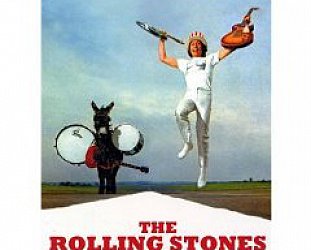
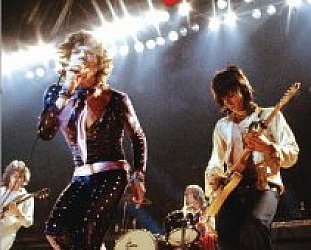
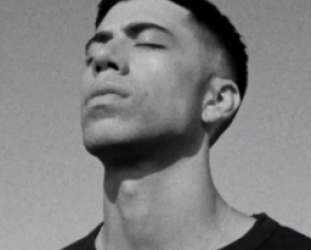
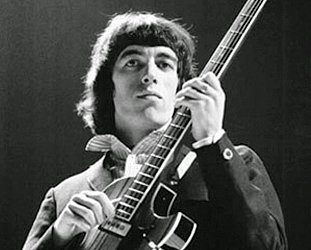
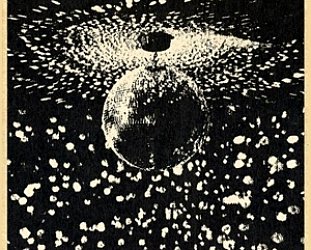
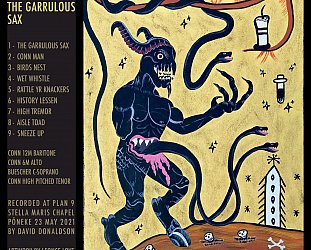
post a comment